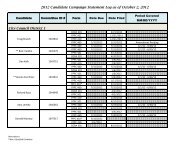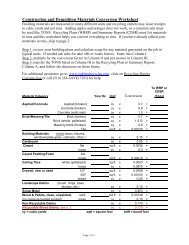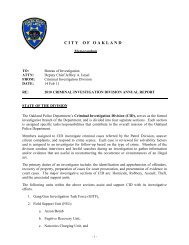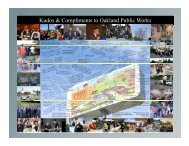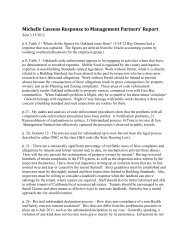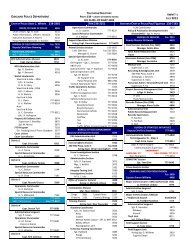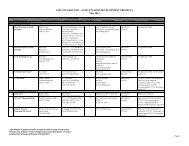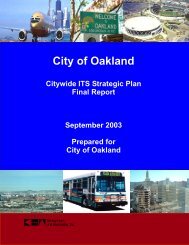The Bratton Group Report - City of Oakland
The Bratton Group Report - City of Oakland
The Bratton Group Report - City of Oakland
You also want an ePaper? Increase the reach of your titles
YUMPU automatically turns print PDFs into web optimized ePapers that Google loves.
eventually the who <strong>of</strong> crime. This information will be generated from multiple <br />
sources, primarily from crime reports, but also including, but not limited to, crime <br />
maps, field interviews, statistics, CAD/RMS data and the debriefing <strong>of</strong> arrested <br />
subjects. <br />
Effective Tactics: District Captains will be responsible, as much as possible, for <br />
sharing information across ranks and units and for the development and <br />
coordination <strong>of</strong> effective tactics and strategies to deal with crime and the conditions <br />
that contribute to crime. Tactics must be comprehensive, flexible and adaptable to <br />
changing trends. <strong>The</strong> tactics must be collaborative, and not only between units in <br />
the DPD. When appropriate, they may involve other law enforcement components <br />
such as the District Attorney’s Office, the Alameda County Sheriff’s Office, Parole, <br />
Probation, the FBI, the DEA and our various federal partners. District Captains <br />
should also continuously seek, encourage and facilitate input from subordinates <br />
when devising crime solution and crime prevention strategies. <br />
Rapid Deployment <strong>of</strong> Personnel and Resources: Once a tactical plan to reduce a <br />
spike in a particular crime has been developed, the deployment <strong>of</strong> personnel and <br />
resources must be rapid and focused. <strong>The</strong> response to pattern crime, especially <br />
shootings, robbery and burglary, demands that patrol and special units know <br />
complete details <strong>of</strong> these pattern crimes, coordinate their resources and expertise <br />
and proceed with a sense <strong>of</strong> urgency. <br />
Relentless Assessment and Follow-‐Up: All plans must be relentlessly followed-‐up <br />
and assessed to ensure that the desired results are being achieved. Action items <br />
from the prior CompStat meeting will be a key component <strong>of</strong> each bi-‐weekly session. <br />
PROCEDURE<br />
CompStat Meetings will be held biweekly on the same day <strong>of</strong> the week and at the <br />
same time, i.e. the second and fourth Wednesday <strong>of</strong> every month at 1000 hours. <br />
<strong>The</strong> primary interviewers conducting the Comptat meeting will be Assistant Chief <br />
Anthony Toribio and Deputy Chief Eric Breshears. I also intend to be an active <br />
presence at each CompStat meeting. As part <strong>of</strong> our re-‐engineered CompStat process, <br />
we are transitioning away from formal presentations by the Captains to a more <br />
focused question-‐and-‐answer, information-‐exchange format. <strong>The</strong> Chiefs will direct <br />
questions to the District Captain and the members <strong>of</strong> his/her team at the podium. <br />
<strong>The</strong> Captain will provide a comprehensive analysis <strong>of</strong> crime issues in his/her <br />
District AND the specific details <strong>of</strong> his/her plans to reduce these crimes. CompStat <br />
meetings will be focused in depth on our primary business <strong>of</strong> delivering police <br />
service, especially reducing crime and addressing quality-‐<strong>of</strong>-‐life issues. <strong>The</strong> <br />
meetings are designed to improve communication, coordination, strategic planning <br />
and accountability at all ranks in our Department. <strong>The</strong> exchange <strong>of</strong> information and <br />
<strong>The</strong> <strong>Bratton</strong> <strong>Group</strong>, LLC <br />
<br />
33




